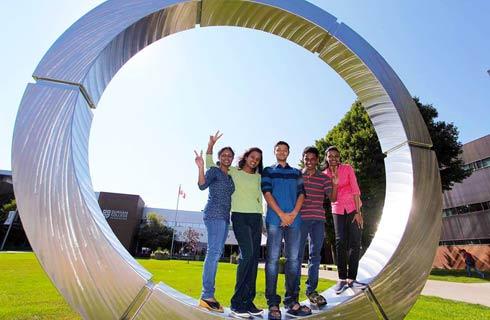行为神经科学哲学博士
Doctor of Philosophy in Behavioral Neuroscience

学历文凭
Ph.D.

专业院系
行为科学

开学时间

课程时长

课程学费

国际学生入学条件
Applicants must have at least a baccalaureate degree at the time they will begin the program.
Grade Point Average: Minimum of 3.0 on 4.0 scale.
Proof of English proficiency
Minimum requirements vary by department. It is recommended that students have a 79 TOEFL, 6.5 IELTS, or 53 PTE-A
IDP—雅思考试联合主办方

雅思考试总分
6.5
了解更多
- 雅思总分:6.5
- 托福网考总分:79
- 托福笔试总分:160
- 其他语言考试:PTE (A) - 53
CRICOS代码:
申请截止日期:请 与IDP联系 以获取详细信息。
课程简介
行为神经科学(BN)的博士课程采用了研究生培训的学徒模式,在该模型中,每个学生都与教师的研究兴趣领域内的教师保持紧密而连续的合作。在您的个人陈述中,重要的是注明您想与之合作的老师。核心学院的研究兴趣可以在学院页面上找到。所有博士 学生是全日制的,仅在白天提供课程。该课程提供了BN领域的基础知识,使学生可以在学生感兴趣的研究主题上进行进一步的自学和发展。大多数学生在攻读博士学位时都会获得硕士学位。在这种情况下,无论是经验性的硕士研究论文还是经验性的博士学位。研究论文是必需的。对于攻读硕士学位的学生,将单独考
The doctoral (Ph.D.) program in Psychology with an emphasis in Behavioral Neuroscience (BN) involves course work on the biological basis of behavior and scientific inquiry . It also has an apprenticeship model in which each student works closely and continuously with a faculty member within the realm of the faculty member's research interests. This work will result in an empirical research thesis and an empirical research dissertation. After completing two years in the program, students must pass written and oral exams to continue in the program. Students are also required to complete a specialty paper for publication. The Ph.D. program is 60 credit hours.<br>Upon completion of the degree, graduates of the Ph.D. in Psychology, Behavioral Neuroscience program at UM-St. Louis will be able to:<br>Goal 1. Demonstrate an integrative understanding of psychological concepts, theories, research, and historical trends in Behavioral Neuroscience and apply this knowledge in research and teaching. (Psychological Science Knowledge Base)<br>Goal 2. Explain and apply the scientific method using a variety of research paradigms to solve problems in Behavioral Neuroscience and articulate how the solutions rely on scientific reasoning. (Critical Thinking)<br>Goal 3. Evaluate, identify, and apply appropriate research methods in Behavioral Neuroscience, including research design, data analysis (i.e., selecting, conducting, and interpreting basic statistical tests) and data interpretation. (Scientific Inquiry)<br>Goal 4. Communicate using a variety of written and oral formats (e.g., papers in the format specified by journal or granting agency, oral research presentations, posters for research at conferences, grant applications, professional publications) in a clear, concise way. (Communication)<br>Goal 5. Evaluate and apply ethical principles to Behavioral Neuroscience research and teaching according to national and international standards, while adopting social and ethical values that build community at local, national, and global levels (Ethical and Social Responsibility)<br>Goal 6. Demonstrate self-reliance and independence in initiating a program of research and carry out research projects from design to dissemination. (Professional Development, Scientific Inquiry)<br>Goal 7 . Display professionalism and ownership of professional growth and learning through an evolving career development plan tailored to one's accurate self-assessment of abilities, achievements, motivations, and work habits. (Professional Development)
The doctoral (Ph.D.) program in Psychology with an emphasis in Behavioral Neuroscience (BN) involves course work on the biological basis of behavior and scientific inquiry . It also has an apprenticeship model in which each student works closely and continuously with a faculty member within the realm of the faculty member's research interests. This work will result in an empirical research thesis and an empirical research dissertation. After completing two years in the program, students must pass written and oral exams to continue in the program. Students are also required to complete a specialty paper for publication. The Ph.D. program is 60 credit hours.<br>Upon completion of the degree, graduates of the Ph.D. in Psychology, Behavioral Neuroscience program at UM-St. Louis will be able to:<br>Goal 1. Demonstrate an integrative understanding of psychological concepts, theories, research, and historical trends in Behavioral Neuroscience and apply this knowledge in research and teaching. (Psychological Science Knowledge Base)<br>Goal 2. Explain and apply the scientific method using a variety of research paradigms to solve problems in Behavioral Neuroscience and articulate how the solutions rely on scientific reasoning. (Critical Thinking)<br>Goal 3. Evaluate, identify, and apply appropriate research methods in Behavioral Neuroscience, including research design, data analysis (i.e., selecting, conducting, and interpreting basic statistical tests) and data interpretation. (Scientific Inquiry)<br>Goal 4. Communicate using a variety of written and oral formats (e.g., papers in the format specified by journal or granting agency, oral research presentations, posters for research at conferences, grant applications, professional publications) in a clear, concise way. (Communication)<br>Goal 5. Evaluate and apply ethical principles to Behavioral Neuroscience research and teaching according to national and international standards, while adopting social and ethical values that build community at local, national, and global levels (Ethical and Social Responsibility)<br>Goal 6. Demonstrate self-reliance and independence in initiating a program of research and carry out research projects from design to dissemination. (Professional Development, Scientific Inquiry)<br>Goal 7 . Display professionalism and ownership of professional growth and learning through an evolving career development plan tailored to one's accurate self-assessment of abilities, achievements, motivations, and work habits. (Professional Development)
相关申请

预科

奖学金

实习机会

在校学习

跨境学习

校园授课-线上开始

在线/远程学习
本校相关课程
性别研究研究生证书

学历文凭
Graduate Certificate
下一个开始日期
课程费用总额
中学教学证书研究生证书

学历文凭
Graduate Certificate
下一个开始日期
课程费用总额
非营利组织管理与领导力研究生证书课程

学历文凭
Graduate Certificate
下一个开始日期
课程费用总额
营销管理研究生证书

学历文凭
Graduate Certificate
下一个开始日期
课程费用总额
物流与供应链管理研究生证书

学历文凭
Graduate Certificate
下一个开始日期
课程费用总额
人力资源管理研究生证书

学历文凭
Graduate Certificate
下一个开始日期
课程费用总额
其他相关课程
和平与冲突研究文学士[一般]

滑铁卢大学
泰晤士高等教育世界大学排名:

学历文凭
Bachelor Degree
下一个开始日期
课程费用总额
解决冲突研究文学士学位

温尼伯大学
泰晤士高等教育世界大学排名:

学历文凭
Bachelor Degree
下一个开始日期
课程费用总额
行为心理学学士(荣誉学位)

圣劳伦斯学院
泰晤士高等教育世界大学排名:

学历文凭
Bachelor Degree with Honours
下一个开始日期
课程费用总额
自闭症与行为科学研究生证书

圣劳伦斯学院
泰晤士高等教育世界大学排名:

学历文凭
Graduate Certificate
下一个开始日期
课程费用总额
行为科学技术高级文凭

圣劳伦斯学院
泰晤士高等教育世界大学排名:

学历文凭
Bachelor Degree
下一个开始日期
课程费用总额
Master of Peace and Conflict Studies

滑铁卢大学
泰晤士高等教育世界大学排名:

学历文凭
Masters Degree
下一个开始日期
课程费用总额





